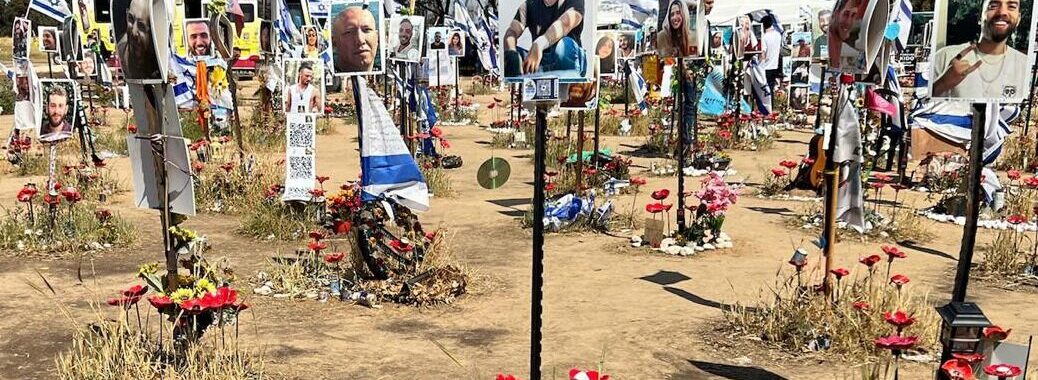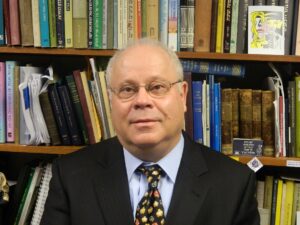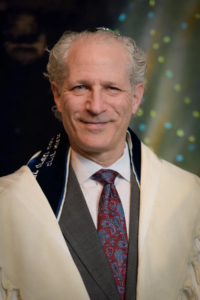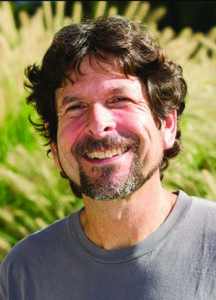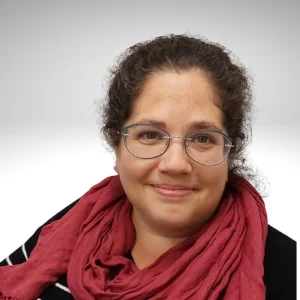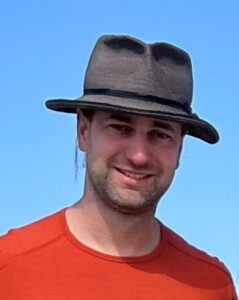By Andrew Adler
Community Editor
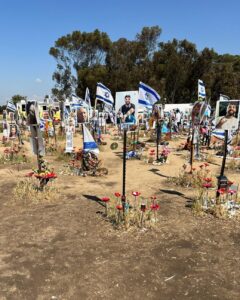
Amid a sea of metal anemones, Nova Festival victims are remembered at the site where Hamas terrorists attacked on October 7, 2023 (photo by Abigail Goldberg)
Against a backdrop of intensifying conflict with Hezbollah and Iran, the international community is marking the first anniversary of an event seared forever in the memories of Jews around the world: the October 7 terrorist attacks by Hamas in Southern Israel. Some 1,200 civilians and soldiers were murdered, and upwards of 250 others were abducted into Gaza as hostages.
Anticipating this somber date, I asked various people in the community and in our Partnership region in Northern Israel to share their thoughts about this darkest of anniversaries. Those contributions follow below.
Rabbi David Ariel-Joel
The Temple
If there is one thing that we can all agree on, it is that 2023 was the worst year in the history of the State of Israel. 2023 started with a cold civil war in Israel, which weakened Israel more and more. Our enemies realized that Israel was weakening itself (as the Israeli intelligence warned the Israeli government at least four times), and chose to attack on October 7, and since then we have all seen this terrible war and a very complex situation. I have never witnessed a society as desperate as Israeli society this summer.
You asked for a prophecy – a path for Israel after this war. Many Israelis consider that October 7 broke everything. Now, Israel is not a continuation of the old Israel, it is a new beginning: Israel 2.0. In 1948 after the War of Independence, Israelis built Israel. My mother always said that 1949 was the most optimistic and the best year of her life. After this current war, there will be an opportunity to rebuild Israel. Like most Israelis, I am pessimistic about the war, where it is going, and the ability of the current government to lead Israel. Also, like most Israelis, I am very optimistic about the ability to heal and build a new Israel.
There is a real opportunity to rebuild Israel, not only because hope is our strength, but like all people, Israelis are afraid of what they remember from the recent past.
In 2023 for the first time in Israel, a full right-wing government, including supporters of Kahana, was elected. The right in Israel always had a fantasy that one day there will be a full-fledged right government. How do you destroy a fantasy… realize it. 2023 brought a full right-wing government, and this has proven to be the most terrible year in Israel’s history, and we don’t know how to get out of it. Away from a terrible war. Away from an attempted legal coup. Away from a terrible division within the people. Away from a government, that in the opinion of most Jews in Israel, is the worst in Israel’s history. A government that is the cause of these great failures and is destroying Israel.
The fantasy of the right wing has proven a trauma for most Israelis.
The center looks like a compromise, Like Parve, it is the best if not the only hope for Israel’s healing and achieving peace.
Let’s hope that the fear of a full-right government, which is currently in power and is leading to the destruction of the State of Israel, will push us to a new place, and create hope for a new Israel.
Cantor David Lipp
Congregation Adath Jeshurun
[Did you think the war would last this long?] No. But in retrospect, unlike previous conflicts, a hostage swap cannot simply return a tense status quo. The killings too severe, intelligence lapses too egregious, threat of future attacks too predictable. Redemption of captives is a primary Jewish value but Sinwar himself was the beneficiary of a hostage swap. The success of the first swap was more than I expected. A final deal without confidence that Hamas wouldn’t be emboldened to attack again, makes it that more complex. Demilitarization needs to be complete, ideally under a trustworthy international regime for the interim.
This looks very different for American versus Israeli Jews. I have always been a proponent of a two-state solution but acknowledge that I don’t know how to get there. Israelis are rightly concerned that any Palestinian sovereign status will allow for this kind of attack in the future and, if granted in the West Bank, in greater population centers. This will lead to even more deaths of not only Israelis but innocent Palestinians trapped as human shields.
The best writing I have read, until we reach a point where such a danger is not present, are the ideas of Micah Goodman, author of Catch 67. He argues that until a two-state solution is plausible from a security standpoint, steps must be taken that give Palestinians as much freedom of motion as possible while maintaining Israeli security. This balancing act has become harder to imagine but is even more necessary to articulate.
Ranen Omer-Sherman
Director of the University of Louisville’s
Jewish Studies program
The events and aftermath of Oct.7 weigh on me constantly. I had a connection to three individuals murdered that day and a good colleague’s son-in-law died this week in the helicopter crash of a rescue mission in Gaza.
Though a tremendous proportion of Israelis have been demonstrating week after week for a ceasefire and hostage negotiations, I am not the least surprised that Netanyahu is immune to those cries as well as the wishes of the hostages’ families; such is the level of his arrogance and self-regard, such is his desperation to remain in power that he believes prolonging this war is essential. Netanyahu considers himself his country’s Churchill. But Churchill, for all his flaws, did not bring a collection of messianic zealots into his cabinet; he did not lead a country while under criminal indictment; he did not leave the state vulnerable to bulldozers and armed men on motorcycles.
The Israel-Palestine tragedy urgently needs better leadership on both sides, more robust involvement from the international community, including a more robust carrot-and-stick approach from the U.S. administration which needs to be more even-handed in working toward a two-state solution. That is the only rational and humane way to prevent more horrific suffering for both peoples. Israel went to war because of a criminal, horrific massacre. But if Israel continues to engage in mass civilian destruction in response; if we keep harming a population, more than 40% under the age of 15, our only achievement will be creating a new generation of vengeful terrorists and perpetuating the cycle of violence. Netanyahu has no answer for the day after the war. But that answer must be a free and safe future for everyone – citizens of Israel, residents of Gaza, and residents of the West Bank who suffer from settler violence. We must break the cycle of violence.
Becky Admony
Grew up in an Israeli settlement in the West Bank, currently lives in Louisville
The seventh of October has changed our life as a Jew in Israel, the United States, and around the world – today, and forever. When I think of that day, it is very hard for me to grasp what has happened to us as a nation. I feel like I am having a bad dream – how did this happen? And there is another side to all this, about which I am not totally surprised. I grew up in the West Bank as a child until I turned 18. That meant living in a small settlement that was surrounded by tiny Palestinian villages. I have a nightmare that has repeated itself for years now, in which a terrorist comes up to my house (we lived on a hill) and sets it on fire, while we are in it.
At the beginning of the Gaza war, I thought, or more accurately hoped, that it would last just a few days or weeks. But as the war advanced, and all the unknowns became known (for example, the extent of Hamas’s tunnel network), I began to realize that it would last much longer. After the first hostage exchange last November, I was optimistic. Unfortunately, resolution seems to get further and further away. After all, we are dealing with a terrorist group. Just as it took years for America to locate Bin Laden, this will take time.
Another tough topic is the growing antisemitism across social media and at various universities in the U.S. Students voice support for Palestine without knowing the relevant facts, or what the phrases they repeat even mean. It is sad and scary at the same time, knowing that in some respects history is repeating itself in regard to the Jewish people.
What will our future look like? I do not know. Sometimes it is terrifying to think about it. I wish we were just at peace.
Beth Salamon
Chair of the Jewish Community Relations Council
We could not have imagined the horrific events of October 7th, and we couldn’t have imagined that we would still be living through this a year later. Our sense of security as a Jewish people has been shattered across the world and our communities’ support for the people of Israel is now more important than ever. Despite the sadness over the past year, I have personally been inspired to stand with my community at events like this past November’s March for Israel and have watched my children wear their Jewish stars with pride. I hope that we will soon have peace, that the hostages will be returned, and that all those who are displaced will be able to safely return to their homes.
Avital Ben-Dror
Assistant Director, Western Galilee Partnership2Gether,
a resident of the Western Galilee
For the past year, life in Western Galilee has oscillated between fear from rocket attacks and attempts at normalcy. As an Israeli who lives in the north of Israel, I have witnessed displaced familie-s, shuttered businesses, and ongoing hostage crises, feeling frustrated by the war’s duration.
The October 7 attacks initially shocked us, but we rallied together. Volunteering opportunities flourished, from cooking to farming, as we sought to support soldiers and victims. This collective action gave us hope for positive change.
However, as the conflict persists, weariness and distrust have set in. People struggle to envision an end to the turmoil.
Our connection with Jewish communities abroad has been a beacon of hope. Their support, from rallies to solidarity missions, reminds us that we are not alone.
Here is a personal anecdote that illustrates this bond:
During one of the recent rocket attacks, our dog Luke ran away. When I shared this seemingly minor concern with our overseas friends, their outpouring of support was overwhelming. Their relief when Luke was found safe was palpable, even from afar.
This is just one example, and we are grateful to have our Partnership2Gether, connecting the Western Galilee region with 17 US Jewish communities and the Jewish community of Budapest, for the many friendships, and the invaluable support.
As we face ongoing challenges, we hope for a swift end to the war, allowing us to address our challenges while regaining a sense of safety, trust, and unity.
Ben Vaughan
Recipient of the JCL’s 2024 Julie Linker Community Relations Young Leadership Award
Oct 7th shattered the thin veneer of protection Israel and Jews worldwide had spent decades building around themselves. The preceding year felt like watching a slow-moving avalanche as world Jewry has had to come to grips with the slow and persistent erosion in the eyes of the world of basic facts about Gaza and Iran-backed proxies Hamas and Hezbollah. The resulting surge of antisemitism and violence targeted at all of world Jewry, the persistently violent rhetoric, and the political quagmire many countries have found themselves in leave little room for hope that a peaceful solution is possible. We have slowly and violently awakened to a world that is fundamentally broken at its core. More and more we are having to come to terms with the fact that our common enemy does not share any of our core values, but instead insists on perpetuating a double standard in a blatant attempt to redefine the “moral” ground, while most of the world is blind to its dangers.
Sarah Harlan
Executive Director, National Council of Jewish Women, Louisville Section and principal of Louisville High School of Jewish Studies
As we approach the one-year anniversary of the Hamas terrorist attack on Israel, while also preparing for the High Holy Days, I find myself in an intellectual and spiritual conundrum. Like most Jews, I was shocked and surprised by the heinous attack – Israel is supposed to have the most advanced defense system in the world – so how could this have happened? And I’m also saddened and amazed that the war is still ongoing. I’m not a political analyst by any means, but I think that as long as Netanyahu remains is in power, we won’t see an end to this war.
But here’s the conundrum: I absolutely believe in Israel’s right to exist as a free, democratic country, to defend itself against terrorists, and to always be a safe haven for the Jewish people. Israel and its allies must demand that every single remaining hostage be released. But what I’m struggling with is how we can ever atone for what I see as a “victory, no matter the consequences” strategy. A central tenant of our faith is pikuach nefesh, the sanctity of every human life. We must continue to advocate for a two-state solution: It’s the only sane, moral, sustainable path forward if we are ever going to achieve lasting peace for all peoples in the region.



